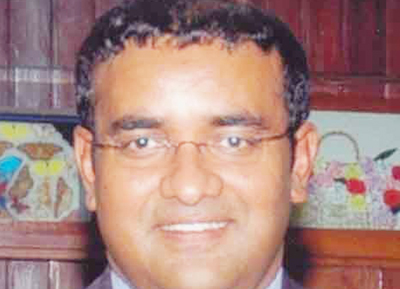The Government of Guyana could not give permission to drug-accused Shaheed ‘Roger’ Khan to import sophisticated computer telephonic surveillance equipment from the Spy Shop in Fort Lauderdale, Florida, into Guyana, it was only the US government, which could have done that, President Bharrat Jagdeo has said.
Speaking on a range of issues at a press conference in New York over the weekend to launch Carifesta at which Minister of Culture, Youth and Sport, Dr Frank Anthony was present, Jagdeo said, “the Government of Guyana can’t give permission to Roger Khan.
“It has to be the US government. It is the US that put restrictions on the export of certain technology. It is only the US government, which could give permission to one of its companies to export, not the Government of Guyana. We did not put a restriction on the export because we don’t have that technology. So it is just so patently false.”
 Jagdeo raised the issue of Roger Khan, while accusing one of the NY-Caribbean area newspapers of not carrying the government’s release on the issue on the importation of the surveillance equipment, but nevertheless carrying the PNCR release on the very issue in which it was stated: “The Government of Guyana gave Roger Khan permission to import some sensitive equipment.”
Jagdeo raised the issue of Roger Khan, while accusing one of the NY-Caribbean area newspapers of not carrying the government’s release on the issue on the importation of the surveillance equipment, but nevertheless carrying the PNCR release on the very issue in which it was stated: “The Government of Guyana gave Roger Khan permission to import some sensitive equipment.”
Addressing the issue of race relations in Guyana, which appeared to have attracted much discussion and taking to task US-based Guyanese political activist Rickford Burke, the President said anyone who went out to bars would see young Guyanese of all races and ethnic groups hanging out together.
He said the United Nations Rapporteur on Race, in his findings, did not find any cases of institutionalised racism in Guyana.
He said while much of the racism practiced might be found among the older folks, “young people are moving on with their lives.”
He advised that they study the political history of Guyana including the US Central Intelligence Agency (CIA) report on Guyana and they would trace the attempts by those who ruled Guyana at the time to divide the Guyanese people.
“They did not want us to have independence; they worried that we [might become] a second Cuba in the Caribbean. They even instigated Venezuela to reopen the border issue,” he said, adding that some were so caught up in a mindset of racial prejudices being practiced in Guyana that they did not look to the historical background.
Contending that Burke talks about ethnocracy being alive in Guyana in every statement he puts out, he said that would continue because the decent people did not challenge his statements.
He claimed that Burke said that 200,000 Indo-Guyanese were given weapons, but even PNCR Leader Robert Corbin would not make such outrageous statements. “You will always have extremists in the society,” he said adding that ROAR Leader Ravi Dev in his extremism said that the PPP was not defending Indians rights and on the other hand claimed that the government was discriminating against Afro-Guyanese.
“The answer does not lie in the extreme but in the mainstream,” he said, adding, “if you come to Guyana you will see the mainstream. More than 95% of our people want to work and live together.”
He challenged Burke to put his charges of ethnocracy to the Ethnic Relations Commission, which, he said, was a rights commission set up with bipartisan support. It should be noted that the current commission has not had the support of the main opposition PNCR.
Apart from the ERC, he explained that there were rights commissions along with an overarching human rights commission to be established with bipartisan support. While only the ERC is currently in place, he said, persons did not have to wait for the others to be established because they could take their cases to the ERC.
The ERC, he said, even has the power to bar a political party from contesting an election if that party used race as a factor to do so.
Perception was one thing, he said, adding, “If you have people like Rickford Burke every week speaking of Guyana as an ethnocracy with no one challenging it here, the perception will persist.” To dispel the perception, he said, the heads of the Guyana Defence Force, Guyana Police Force, Central Bank, Presidential Secretariat, Statistical Bureau, and the Prime Minister, to name a few, he said were Guyanese of African descent.
When someone remarked that a US presidential candidate was Black, Jagdeo said, “You will have a Black President. And I will be very happy if you have a Black President. The thing is you never had a Black President before.” He said that in the US Supreme Court there was one Black person and within the US Congress, a limited number of Blacks. Just a few years ago, he said, there was not a single Black or Hispanic person in high office.
“If you go to our judiciary, if you go to my Cabinet, if you go to the Parliament – the three branches of government — you will see what they look like,” he said.






